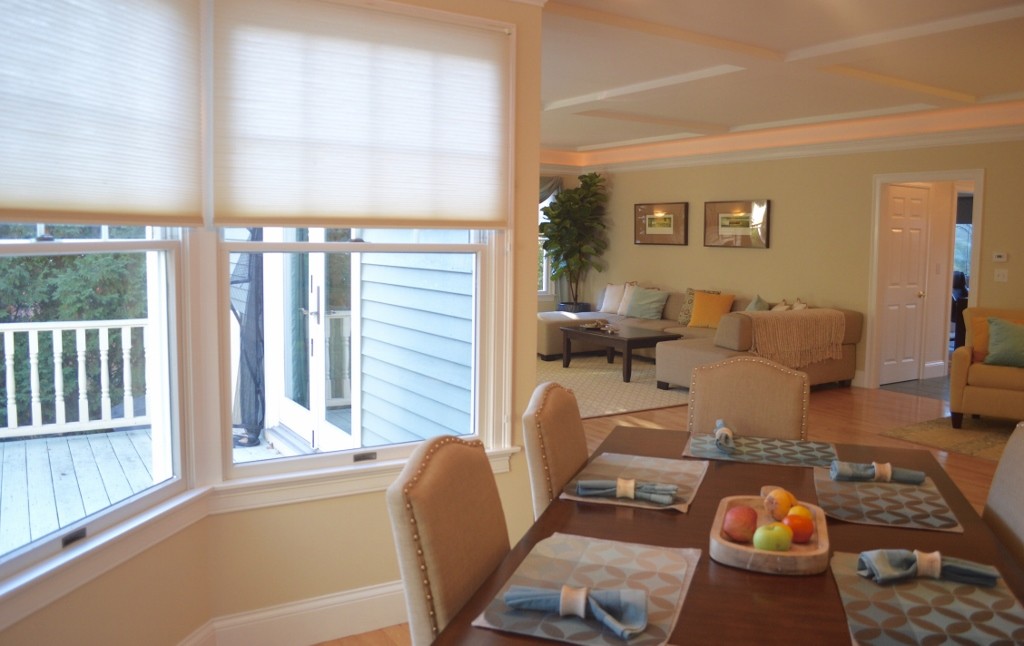Sober living homes are a great living option for individuals who are making progress with their battles with addiction. For those who have done the work to get sober, it can be hugely beneficial to live in communities with like-minded individuals to help maintain sobriety.
Table of Contents
- What is a Sober Living Home?
- What Can You Expect in a Sober Living Home?
- What Are the Benefits of Residing in a Sober Living Home?
- A Sober Living Home Can Help You to Maintain Your Sobriety
- When is the Right Time to Move into a Sober Living Home?
- How to Find a Sober Living Home that Fits Your Needs
- Tharros House: A Sober Living Home in the Boston Area of Massachusetts
What is a Sober Living Home?
A sober living home can serve as a bridge between an inpatient rehabilitation facility and the “real world.” After a person leaves an inpatient facility and returns home, they may have difficulty adjusting back to their daily life.
Sober homes can give someone a type of in-between recovery option that gives them the opportunity to practice the lessons they learned in rehab and the support of a sober community before jumping right back into their lives. For some people in recovery, a sober living home can make the difference between staying sober and relapsing back into their addiction.
These homes do not provide residents with the same level of structure as they would experience in an inpatient facility; however, sober living homes have the benefit of providing residents with an intermediate form of sober environment that encourages its residents to work on healthy habits and coping skills for when they return to their homes.

What Can You Expect in a Sober Living Home?
Before making the decision to move into a sober living home, it can be helpful beforehand to get an idea of what you can expect.
When you stay in an inpatient treatment center, as a patient, you are completely immersed in the center’s rehab programs, and you typically do not have a lot of independence. In sober homes you have more freedom and get the chance to have some of your independence back.
Residents living in a sober living home are not required to stay there at all times; rather, they have the ability to come and go as they please. Having this freedom gives individuals in recovery the chance to ease back into their normal life and begin resuming their daily responsibilities and tasks.
Although sober living houses tend to be less restrictive than inpatient facilities are, these homes still do have rules that residents are required to abide by. Some of these rules include attendance at group meetings, events, and a curfew.
What Are the Benefits of Residing in a Sober Living Home?
There are certainly many benefits to living in a sober living home. Residents have the opportunity to attend 12-step programs close by, often on the premises. Sober living homes also provide the benefit of a structured lifestyle while creating an environment for sober friendships and companionships to thrive.
Staying in a sobriety house helps you to be better able to hold yourself accountable to take ownership of your sobriety and overall progress. A big of this is creating positive friendships that allow you to help each other to abstain from alcohol and drugs.
Having such a great support system gives residents the opportunity to avoid the isolation that can sometimes occur during the process of returning to their former homes while in recovery. It also provides residents with an environment to help support them during their recovery from substance abuse and also addiction, from those who are just transitioning over from their stay in rehab.
Sober living homes provide a unique combination of structure and freedom that can help an individual in recovery start to readjust to life outside of rehab. In fact, these homes are set up specifically to serve as a transitional housing option for people who are just coming out of treatment for addiction.
A Sober Living Home Can Help You to Maintain Your Sobriety
Sober living homes can act as a supplement to a person’s recovery from addiction. These homes are an alternative from going straight from an immersive care environment to an unstructured home environment. Since sober homes are designed to replicate normal and everyday life situations while also instilling healthy habits, these homes help to reduce a person’s chance of relapse.
Other benefits of sober living homes may include:
- Helping with things that will help you progress with their recovery and maintain their sobriety, including making amends with family and friends who were impacted by their substance abuse and helping their residents to adjust to sober living in an unstructured environment.
- Help finding a job with resources provided by the facility, such as computer access, and often provide transportation services so residents can attend job interviews.
- Sober living houses are not meant to be forever homes, so they can also provide you with the resources to locate more permanent housing when ready.
- Help with creating carefully designed plans for aftercare. These plans should include a relapse prevention plan that can be individualized to each resident. This can be done by therapy sessions that either take place on the premises or are conducted electronically.
Sober Living Therapy Sessions
Therapy sessions can be helpful for sober living home residents in many ways.
Through therapy, residents may learn to identify triggers that could entice them to go back to engaging in substance abuse once they leave the sobriety house and re-acclimate into the community. It can also give residents the tools to learn and practice healthy coping skills during times of high stress and cravings or urges to use.
With therapy, residents can create a plan of action to prepare themselves for those times that will inevitably occur in the future and help them to make the right choices and avoid relapsing.

When is the Right Time to Move into a Sober Living Home?
A good time to move into a sober living home is after you have completed an inpatient rehab program and are ready to begin acclimating back into society. Sober living homes are good transitional residences for those who feel almost ready to go back into their normal lives—but want to have extra support and learn additional coping strategies beforehand.
Moving into a sober home has the benefit of helping you create a solid support system with friends who are going through the same or similar things that you are. These friendships can help you not just during your time residing at the sober living house, but can help you in many ways down the road and throughout the rest of your life.
Sober living homes provide residents with many benefits and can be significantly useful for many people during the process of recovery from addiction. In many cases, people who choose to stay in them tend to live there for at least ninety days, but it is possible to stay longer if necessary.
How to Find a Sober Living Home that Fits Your Needs
Once you have made the decision that living in a sober living home is the right choice for you at this stage in your recovery, you will next need to start your search to find the right home.
When you begin your search, there are some things to keep in mind that are considered red flags. First, you should be wary of a sobriety house that claims to be free or seems particularly cheap. As it is a residence, you should expect to pay an amount at the very least, similar to rent in your area. While the exact cost will differ depending on location and amenities offered, you can expect to pay anywhere from a few thousand per month to $10,000 per month.
Another thing to do while you search is to make an appointment to tour the sober living home in person. You should not just rely on website pictures prior to making a commitment. Viewing the home in person not only gives you a clear picture of what the residence actually looks like, but you can also get a general vibe of the place.

Look for a sober living home that has a set of rules / minimum requirements. The biggest requirement should be that all residents are alcohol and drug-free in order to promote a positive environment for addiction recovery. These facilities should conduct some sort of background check on potential residents in order to ensure the safety of their current residents.
It is also important to learn about the sober living home’s safety and privacy policies. As a resident, you are entitled to a certain amount of privacy in your living area. There should be safety precautions put in place, such as locked doors and a no-weapons policy. It is also beneficial to have security cameras in common areas and in entrances and exits.
It’s a red flag if the sober home you are considering does not have trained or certified staff. It is important that the staff working at a sobriety house has a certain amount of training and experience to ensure that they can handle issues that may arise during a resident’s stay. A well-trained staff can also lead more effective group meetings and other events offered by the sober living home to its residents.
Tharros House—A Sober Living Home in the Boston Area of Massachusetts
If you are looking for a sober living home in the Boston Area of Massachusetts, the Tharros House is a stand-out facility that can help you maintain your sobriety and grow as a person in the process. The Tharros House combines a sober living community with aftercare in order to assist their clients in acquiring new skills to meet life’s challenges.
Tharros House’s mission is to help their clients find success with long-term recovery and move on from negative things in their past. Their sober living home places a high value on integrity and honesty, and the staff members take the time to help their residents cultivate a new and constructive sober lifestyle.
With over 40 years of combined experience with recovery, the team at Tharros House understands the difficulties that their residents face, and they have a genuine desire to help their residents get back to leading a fulfilling and happy life.
Why Choose Tharros House?
The team at Tharros House prides itself on taking a custom approach with each of their clients, beginning with making sure that they have a full understanding of each person’s individual needs. Our team makes sure to build a connection which each resident’s clinical providers in order to help fully understand what support is needed before that resident moves in.
At Tharros House, the team takes the time to connect with local Boston-area professionals and providers that can help our residents in many areas. We can help with referrals to clinical therapy, couples and family counseling, addiction classes, therapy groups, nutrition and wellness services, life coaching, stress management, exercise and physical training.

All clients at Tharros House receive an introduction to wellness and nutritional eating, including group discussions with a registered dietitian. We also offer nutritional cooking classes, mindfulness, and recovery yoga on site.
Tharros House amenities include a full chef’s style kitchen with high-end appliances, a ping pong table, flat-screen TVs, and a quiet dining room. There are seven large bedrooms, six full bathrooms, and two outside deck areas, along with an office with computers and printers that are available for clients to use.
The Tharros House in Boston, Massachusetts has many benefits to offer its residents. In addition to referral services and local connections, Tharros House also offers many fun onsite activities that encourage residents to let loose and have a good time without the use of alcohol or drugs.
Residents at Tharros House have the opportunity to make life-long friendships that can help them maintain their sobriety and, overall, enrich their lives. To learn more about what Tharros House has to offer you, contact us today at (617) 249-1087 or fill out the contact form on out site.
Tharros House is for men only. If you are interested in learning more about sober living for women, please check out Tera’s House.



